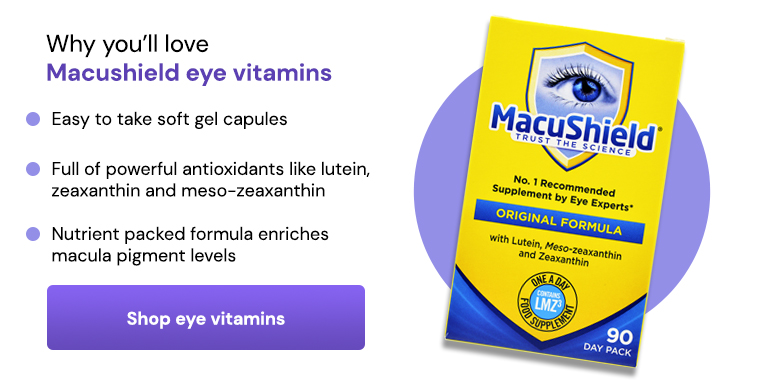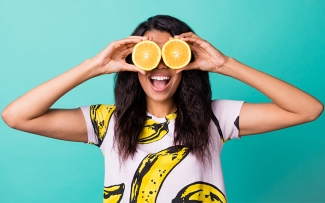How different diets affect your eyes
What we eat plays a massive role in our overall well-being, and much like a high-performance machine, the quality of fuel you feed ensures that it will operate more efficiently and to its best ability. This is why you've likely heard the familiar phrase 'You are what you eat' at some point in your life.
When it comes to our bodies, it's been proven that eating a clean and well-balanced diet boosts the health of everything from hair to heart flow and even your eyesight. One of the easiest ways to improve your eye (and overall) health is by examining your diet to see if you're getting the appropriate vitamins and nutrients to keep all systems running smoothly.
While some factors, like genetics, play a significant role in eye health, many studies have shown that one's eating habits also play an essential part in promoting healthy eyesight and reducing diseases. Let's look at a handful of common diets and their benefits and potential disadvantages for your long-term vision.
How an Omnivore Diet Affects Your Eyes
One of the most popular and traditional eating styles worldwide, an omnivorous diet consists of eating both plant and animal products. When practised correctly, an omnivorous diet can be one of the best all-around options for maintaining excellent eye health. This diet allows your eyes to draw vitamins and minerals from both plant and animal sources to obtain nutrient requirements without needing additional supplements. However, fine-tuning the balance of this eating approach is imperative to keeping a healthy lifestyle overall.
Fish species like salmon and tuna are high in Omega-3, an essential fatty acid in retinal development and supporting tear production. Beef and shellfish are rich in zinc, which helps maintain the protein structure of the eye. When these animal products are paired with leafy greens and other antioxidant-rich fruits and vegetables – they form a robust diet for healthy eyesight.
The potential downside of an omnivorous diet is that if not done in moderation, it may have harmful effects on your eyes. Large amounts of processed meat products can lead to high blood pressure and high cholesterol, which may block blood flow to the eye, and overeating certain fish can also damage the eye (amongst other organs) through mercury poisoning.
How a Vegetarian Diet Affects Your Eyes
Keeping your eyes healthy while maintaining a vegetarian diet is relatively simple, as many nutrient-rich foods that aid eye health are regularly featured in vegetarian dishes.
Leafy greens like kale and spinach, alongside carrots and sweet potatoes, are stacked with beta-carotene, which acts as an antioxidant and vitamin A booster. As a protein source, many vegetarians incorporate eggs into their diets, which are rich in zeaxanthin and lutein – two nutrients that slow the progression of macular degeneration.
Dairy products like yoghurt and milk are great alternatives to replace some of the vitamin A and zinc supplements more commonly found in meat and fish that help protect the protein structure of the eye.
A potential downside of a vegetarian diet is that they often lack Omega-3 fatty acids in everyday dishes that assist with reducing the risk of dry eye, glaucoma, and cataracts. This issue is easily remedied when vegetarians add flaxseed or chia to their meals or snack on nuts and seeds – all reliable sources of Omega-3s.

How a Vegan Diet Affects Your Eyes
An offshoot of vegetarianism, a vegan diet consists solely of eating foods derived from plants and abstaining from animal products. As one of the fastest-growing diet styles worldwide, eyesight-wise, there are some potential factors to consider when following this eating habit. The main challenge to maintaining healthy eyes as a vegan is finding steady sources of vitamins and proteins through only natural plant-based options.
An ideal vegan diet to support healthy eyesight would include a mixture of beans and pulses to boost zinc levels. Fruits and vegetables like broccoli and oranges high in vitamins (A, C, & E) and carrots and mangoes packed with carotenoids should also be eaten regularly. To assist the cells that help in the cornea and retina, walnuts, certain seeds, and oils provide Omega-3 needs without animal byproducts (albeit at lower rates). To meet other nutrient needs that are beneficial for healthy eyes, like B12 and Niacin, many vegan-society-approved supplements are available to fit the bill.
It is worth noting that with the rise in the popularity of vegan diets, a flood of ultra-processed meat-free alternatives has come onto the market. Many of these are high in sodium, which can lead to blood pressure issues and dry eye syndrome. They also tend to be formed of refined carbohydrates, a process that diminishes the effectiveness of fibre and vitamins.
Ultimately, if practised correctly, a vegan diet can certainly keep your eyes in tip-top shape when regularly opting for foods that are dense in nutrients and using supplements to address areas where vitamin deficiencies exist.

How a Gluten-free Diet Affects Your Eyes
A gluten-free diet has little effect on eye health, as grains, wheat, and gluten generally don't provide large amounts of vitamins that aid eye function.
However, it is common for people with celiac disease to experience vitamin deficiencies through malabsorption and intestinal damage. This issue leads to lower levels of zinc, vitamin B12, and vitamin A, which are all essential to maintaining healthy eyesight.
How a Paleo Diet Affects Your Eyes
Another diet that has gained popularity in recent years is the Paleolithic diet. AKA the 'Caveman' diet, it relies heavily on meat, fruits, nuts, and other basic unprocessed foods.
Many paleo plates are often meat-centric and supply the eyes with nutrients like zinc and niacin to support the optic nerve, but the key to maintaining eye health with this diet is variety. Fruits and vegetables should be the staple of every meal to enlist an abundance of antioxidants and vitamins A & E to the body. Since processed food is a no-go in most paleo diets, many people opting for this diet have reported healthier blood sugar levels, which reduces the chances of diabetic retinopathy.
Dairy consumption is often discouraged from the Paleo diet, which may lead to lower vitamin D levels. Low levels of this essential vitamin may lead to macular degeneration and hampered vascular flow to the back of the eye. These issues can be avoided by taking recommended vitamin supplements to offset the deficiency.

How an Unhealthy Diet Affects Your Eyes
Undoubtedly, the worst diet for your eyesight is an unhealthy one. Which often consists of ultra-processed and deep-fried fatty foods. When your diet lacks foods loaded with antioxidants and vitamins, your body receives insufficient nutrients, as do your eyes.
Trans fats in many fast-food items may increase cholesterol levels, leading to heart disease and a host of eye issues, such as macular degeneration. Obesity is another consequence which can lead to diabetes and, as a result, diabetic retinopathy. The latter can ultimately lead to vision loss.
Since your eyes rely on a complex system of blood vessels, high blood pressure is also a potential danger to your vision. Many prepackaged foods are loaded with sodium and preservatives to keep them shelf-stable, and indulging in them negatively affects your cardiovascular system over a period of time. People with elevated sodium levels have been linked to a higher development of cataracts.
Final word
When possible, the best way to provide your eyes with the building blocks they need is via quality food sources and a clean diet. While eye vitamins like MacuShield, MacuShield Vegetarian, and Ocuvite Complete can help bolster your immune system and prevent some eye problems – taking account of what you eat on a daily basis should be your first step.
Remember that dietary preference is only one of the components of maintaining healthy eyes. Sleep, sun exposure, genetics, and many other reasons are contributing factors to why you may experience eye issues. As with all eye concerns, regular eye tests and contacting your optician when you notice any changes are essential to maintaining clear vision in the long run.



